Key takeaways:
- Off-season travel offers significant savings on flights and accommodations, allowing for more luxurious experiences.
- Visiting popular destinations during off-peak times leads to fewer crowds and greater immersion in local culture.
- Planning flexibility, mid-week travel, and engaging with locals enhance off-season travel experiences.
- Staying informed about local conditions and prioritizing personal safety are essential during off-season trips.
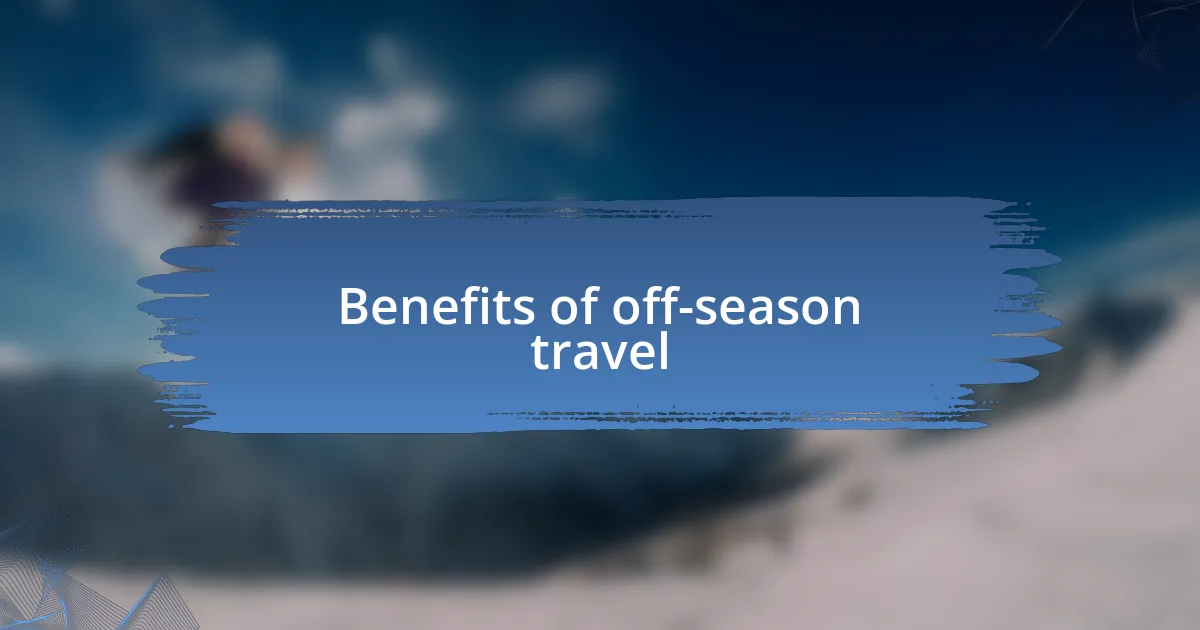
Benefits of off-season travel
One significant benefit of off-season travel is the incredible savings you can achieve. I remember planning a trip to Italy in the fall instead of summer, and the price differences were astounding. Not only did I snag a bargain on flights, but accommodations were also much more affordable, allowing me to enjoy a lovely hotel that would have been out of reach during peak season.
Traveling during the off-season often means fewer crowds, which can be a game changer for your experience. On a visit to a popular museum, I found myself almost alone in the exhibits, allowing me to take my time and truly absorb the art. Isn’t it much more enjoyable to wander through a city without jostling for space?
Finally, the local culture tends to shine brighter when tourism is at a lull. During my off-season visit to a coastal town, I was able to join a small cooking class run by a local chef who shared family recipes and stories with us. This intimate experience made me feel more connected to the place, creating lasting memories that would have been hard to capture during a bustling summer rush.
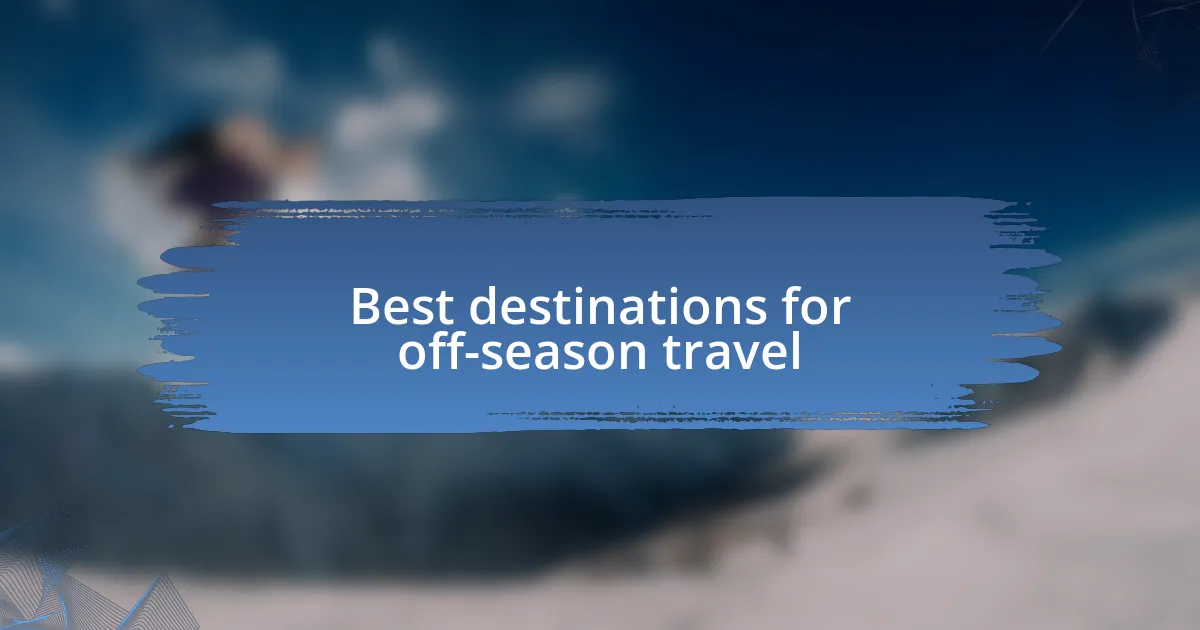
Best destinations for off-season travel
When considering the best destinations for off-season travel, I often think of places that truly transform outside of peak tourist times. For example, exploring Kyoto in November is magical. The vibrant fall foliage creates a picturesque backdrop, and the temples feel almost serene without the usual crowds. I experienced this firsthand when I found myself sitting quietly in a garden, soaking in the tranquility and the stunning autumn colors, something that would be impossible in the high season.
Here are some top off-season destinations to consider:
- Iceland: Experience fewer tourists while marveling at the Northern Lights during winter months.
- Santorini, Greece: Visit in late September or October for milder weather and empty beaches.
- Marrakech, Morocco: Discover the charm of the city in the cooler months of late fall or early spring.
- New Orleans, Louisiana: Enjoy the festivities during Mardi Gras in January or explore the vibrant French Quarter in the quieter summer months.
- Barcelona, Spain: Experience the city’s culture and architecture in the spring, enjoying views without the summer heat and crowds.
These locations not only provide a quieter environment but also allow for deeper connections with both the places and the people, as I found in Marrakech, where I chatted with street vendors who had more time for engaging with visitors. It’s these kinds of connections that linger long after the trip is over.
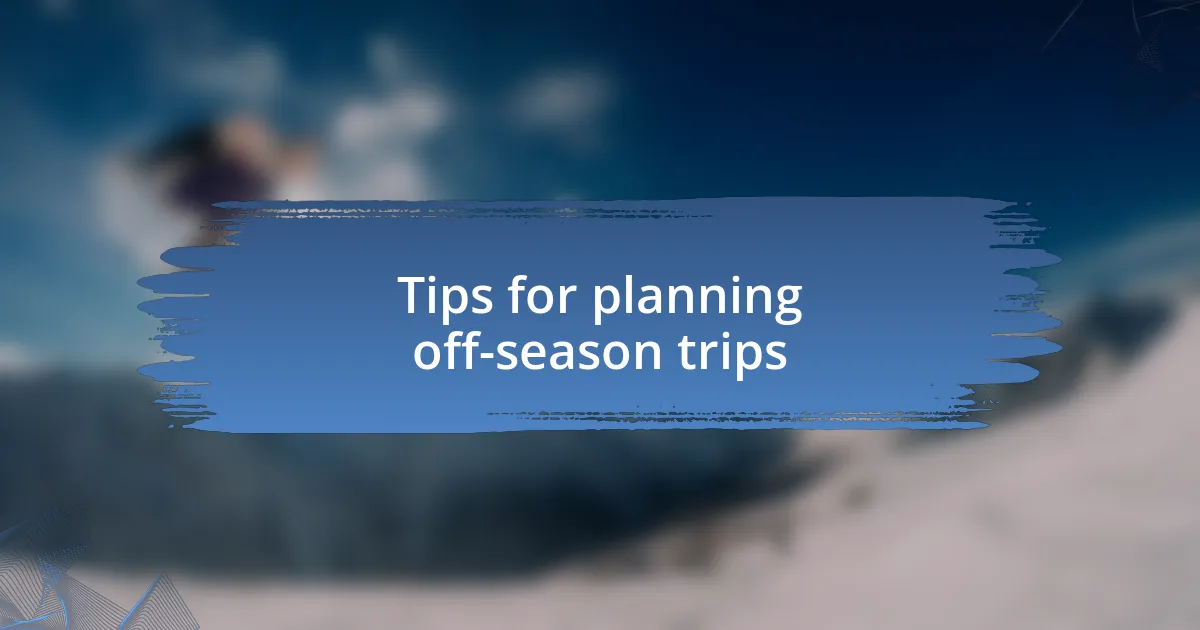
Tips for planning off-season trips
When planning off-season trips, flexibility is your best friend. I remember one particular trip to Portugal, where I adjusted my itinerary on the fly due to unexpected weather. This spontaneity not only allowed me to take advantage of quieter attractions but also led to unique experiences, like stumbling upon a local festival that I wouldn’t have seen during peak season.
Choosing your travel dates wisely can save you both money and hassle. As an example, consider traveling mid-week instead of on weekends. I noticed significant price reductions on accommodations and flights during my off-peak travels. It’s a small adjustment that can enhance your experience and give you access to more personalized service, which is often harder to come by when the crowds are in full swing.
Lastly, don’t forget to embrace the local culture during the off-season. Engaging with locals can lead to memorable experiences. I once shared a meal with a family in a small Italian village that felt even more special because we were their only guests that evening. The personal stories, laughter, and shared food created a connection I still cherish, reminding me of the beauty found in taking the road less traveled.
| Tip | Description |
|---|---|
| Be Flexible | Adjust your itinerary for better experiences and surprises. |
| Travel Mid-Week | Save money and enjoy less crowded attractions. |
| Engage with Locals | Immerse yourself in authentic experiences and create lasting memories. |
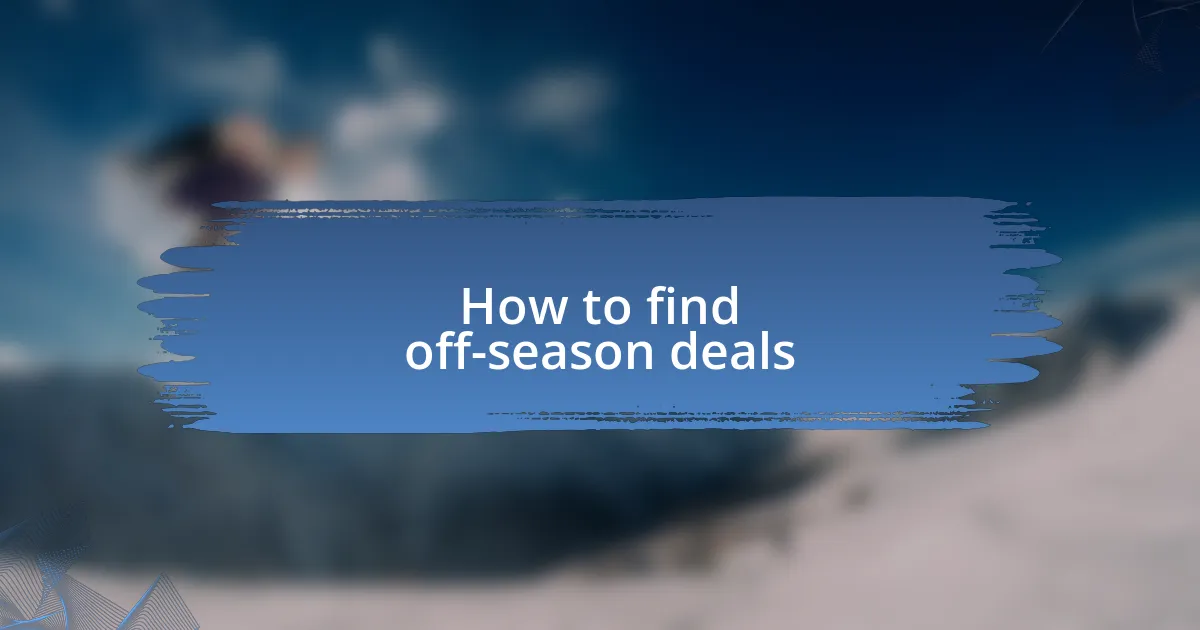
How to find off-season deals
One of the most effective ways I find off-season deals is by subscribing to travel deal alerts. I still remember the thrill when I received an email about discounted flights to Iceland in late September. It was unexpected, and it forced me to reconsider my travel plans, but it ultimately led to one of the most breathtaking trips I’ve ever taken. Are you missing out on similar opportunities because you aren’t signed up for those alerts?
Exploring less conventional travel websites can also unveil hidden gems. On one occasion, I stumbled across a site dedicated to budget travel during a routine search for my next adventure. This platform introduced me to charming accommodations that were significantly more affordable during the off-season, allowing me to save money while enjoying unique stays. Who says you need to stick to the main websites to find great deals?
Finally, be sure to check social media for flash sales and exclusive promotions. I often find myself scrolling through travel-themed Instagram accounts and Twitter feeds, discovering time-sensitive deals that aren’t widely advertised. It can feel like a treasure hunt, and the excitement of snagging a fantastic bargain in an unexpected way adds to the joy of travel planning. Have you considered how social media can transform your travel experiences?
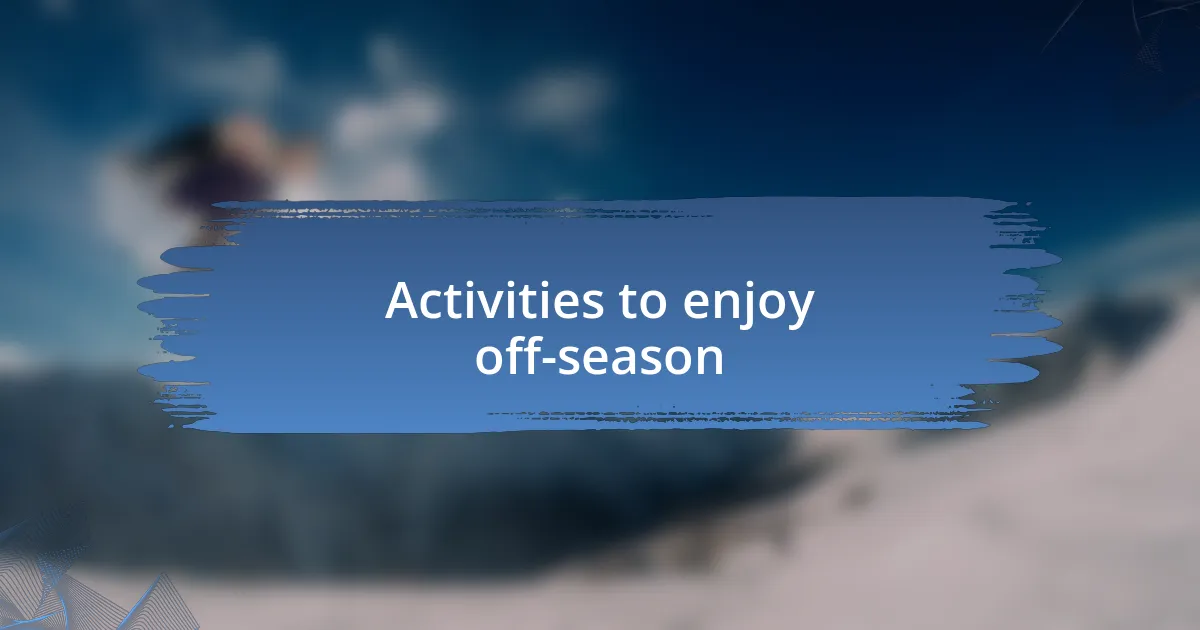
Activities to enjoy off-season
Hiking during the off-season can feel like uncovering a hidden world. I once ventured to a national park in early November, and the tranquility of the trails was astonishing. Without the crowds, I could immerse myself in the breathtaking views and crisp autumn air, all while appreciating nature at its finest. Have you ever thought about how a little peace and quiet can elevate your outdoor experience?
Culinary tours are another delightful way to spend your off-season. I remember joining a local food tour in a small town during the lull between summer tourists and winter holiday crowds. The chef was passionate about the seasonal ingredients, which brought a new depth to the flavors we sampled. It was less about the dishes served and more about the stories behind them that made me feel truly connected to the place. Wouldn’t you agree that food can be a window into local culture?
Visiting museums or cultural sites is often more enjoyable when it’s less crowded. On a chilly day last winter, I found myself wandering through an art gallery where I could take my time with each piece. I remember feeling a deep sense of appreciation as I stood in front of a massive painting, absorbing its nuances without the distraction of other visitors. Isn’t it refreshing to engage fully with art and history without feeling rushed?
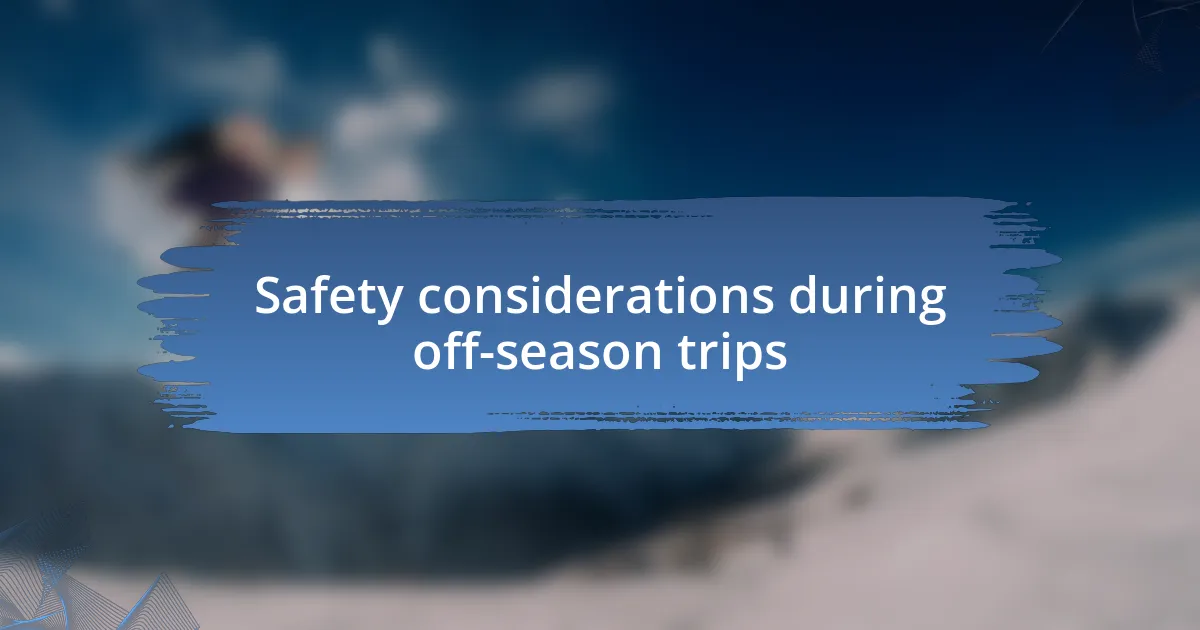
Safety considerations during off-season trips
When traveling during the off-season, I make it a priority to stay informed about local conditions. I once visited a coastal town in the winter when a sudden storm rolled in unexpectedly. It reminded me that being aware of weather forecasts and local advisories is essential; it can be the difference between a great trip and a stressful one. Have you ever been caught off guard by changing weather?
I also believe that personal safety should never be overlooked. During one off-season trip, I found myself exploring a quiet city after dark and realized that the lack of people made it feel both peaceful and slightly eerie. I learned the importance of staying in well-lit areas and having a backup plan, like knowing the location of nearby accommodations. Have you ever felt that strange mix of peace and unease while traveling?
Transportation can pose unique challenges in the off-season as well. On a road trip last spring, I encountered several stretches of highway that were poorly maintained due to the lack of tourist traffic. It was a valuable lesson for me to ensure my vehicle was in good condition before hitting the road. What kind of preparations do you think are necessary before embarking on an off-season adventure?


